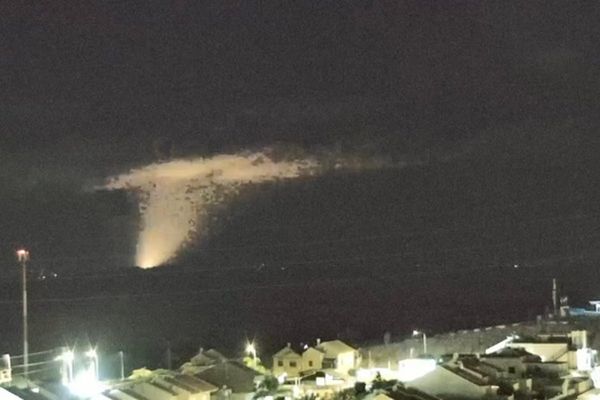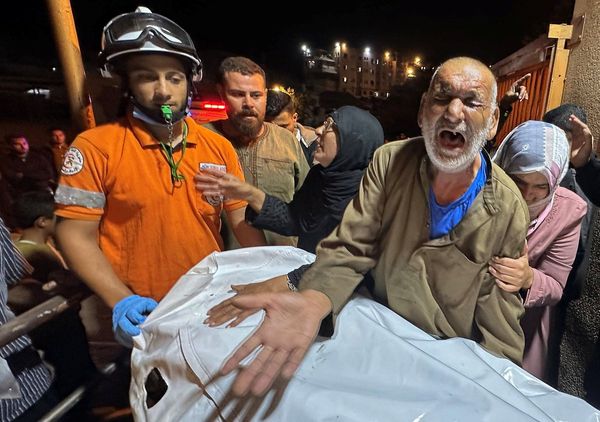
At least 64 people have reportedly been killed in Rio’s worst-ever day of violence as more than 2,500 officers and special forces stormed an area of favelas near Rio’s international airport that is considered the headquarters of one of Brazil’s most powerful organised crime groups.
The predawn police raid – the deadliest in Rio’s history – sparked intense gunfights in and around Alemão and Penha favelas, which are home to an estimated 300,000 people.
Drug traffickers from the Red Command criminal faction started shooting and set barricades and cars alight as civil and military police and special forces began their advance shortly after 4am. For the first time, the gang reportedly used weaponised drones to drop explosives on special forces teams.
Gunshot wound victims were carried to a local hospital throughout the morning and by afternoon at least 64 people had been killed, including four police officers. “There are bodies strewn all over the streets,” one community leader told the Rio newspaper O Globo.
Eight police officers and four residents were wounded. Horrific photos of some of the young male victims spread on social media.
Rio’s rightwing governor, Cláudio Castro, declared the city “at war” and said it was the biggest police operation since a 2010 raid in the same region.
“This is no longer common crime, it’s narco-terrorism,” Castro said in a video posted on social media showing armoured personnel carriers at the start of the mission.
More than 80 people were reportedly arrested and at least 93 automatic rifles were seized. The weapons are a sign of the powerful arsenal Rio’s drug traffickers have acquired since they began flooding the favelas in the late 1980s.
Victor Santos, Rio’s security secretary, told local television that “Operation Containment” had been ordered to capture Red Command gang members, who control of large chunks of Rio and are increasingly present in other parts of Brazil, including the Amazon region.
Rene Silva, a community activist and journalist from Alemão who runs a local newspaper called Voz das Comunidades, said he had been woken by gunfire at about 5am.
He voiced despondency over the government’s insistence on conducting deadly and ultimately ineffective police raids into the favelas.
“This doesn’t solve the problem,” Silva said. “Rio’s crime problem needs to be combated in other places – not just in the favelas. We don’t have plantations of marijuana or cocaine here. We don’t have gun factories here. This isn’t a fight against crime, it’s a fight against poverty.”
Glória Alves, a 65-year-old resident of an area of Alemão called Palmeiras, said she was woken shortly after 4am by her barking dog. Alves went into her bathroom, “and there was this volley of shots – so, so many shots. It was horrible”, she said. The shooting continued around her home throughout the day. “We have no idea what time this will all finish,” she added. “It hasn’t stopped. It isn’t over. And I don’t know what time it will end.”
Human rights activists and opposition politicians voiced outrage at the historic day of bloodshed. “What is happening in Alemão and in Penha isn’t an operation – it’s a state-sponsored massacre,” tweeted Lucia Marina dos Santos, a state congress member for the leftwing Worker’s party (PT). Santos accused authorities of turning Rio’s favelas into “war zones” as part of their failed “war on drugs”.
With police operations and gunfights reportedly continuing on Tuesday afternoon, the death toll could still rise.
Until Tuesday, the highest number of deaths during a single police operation happened in May 2021, when 28 people were killed during a police assault on Jacarezinho, another large favela that is considered a Red Command stronghold.
Over the past four decades Rio’s redbrick favelas have fallen further under the control of heavily armed criminal groups, primarily the Red Command, the Pure Third Command, and a constellation of paramilitaries gangs whose ranks often include off-duty members of the security forces. In recent months the Red Command has embarked on a major offensive to seize control of territories in western Rio controlled by paramilitary groups called militias.
Castro said police across Rio had been placed on high alert amid fears drug bosses could order attacks in reprisal for the operation, and on Tuesday afternoon criminals could be seen trying to close some of the city’s most important motorways and roads, including the one leading to the airport. Schools, shops, bars and restaurants all over Rio closed down for fear of attacks and bus companies recalled their fleets, causing rush hour chaos for commuters.
As he stood at one of Alemão’s main entrances on Tuesday afternoon, watching bullet-proof police vehicles drive in, local activist Raull Santiago said the situation remained tense.
Santiago called the killings “a massacre, a brutal landmark in the history of this city … and of Brazil as a whole”. “Warlike” police operations were nothing new to Rio, Santiago said. “But they leave profound marks on those who live in the favelas … Once again the favela is bleeding, once again we are counting an ever increasing number of bodies.”
Additional reporting by Melissa Cannabrava in Rio de Janeiro







